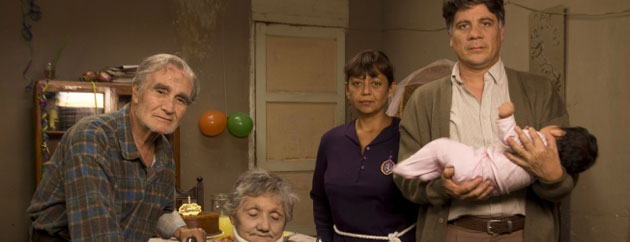
Octubre
28 June, 2012Octubre follows the journey of pawn-broker cum loan-shark, Clemente, as he gradually discovers humanity. He leads a dull, lonely, and selfish life, defining his existence and relationships through money and receipts; transactions all meticulously logged in his pocket book. He allows his father to live on the streets and ensures anyone in the community who tries to get close to him is kept distant through his systematic and well practiced rudeness and ignorance, whilst Clemente’s only real financial expenditures seem to be his frequent and impersonal visits to the local brothel.
Once his bastard baby mysteriously appears in his front room, Clemente begins a journey of self discovery and his outlook on life begins to change — albeit painfully slowly. As he desperately searches the brothels of Lemur for the child’s mother, Clement reluctantly acquires an awkward sort of family unit, made up of good natured people Clemente has lived around for years, who have persistently tried to break through into his life.
That said, Octubre is not a heart warming or inspirational film. It is a depressing and cold look at the life of an unlikable miser. Clemente is respected, and almost liked in the community, not because of his personality, but because of his station as local loan-shark, and as his father’s son, who is apparently well liked and good natured. In a community full of poverty and desperation, Clemente’s name is synonymous with a quick-fix solution to financial worry, a position he maintains with ruthless efficiency and an unyielding lack of sympathy, even to his family.
The plot is intertwined with rather unsubtle and contrived metaphors for each character which mirror the emotional development of their human counterparts. Clemente, for instance, is passed a fake banknote whilst his usual exacting attention to detail is distracted by his baby. The note goes with him on his mission for the child’s mother, as he unsuccessfully tries to pass it off to shopkeepers, hookers, and even family members. At the same time his father completes competition crossword puzzles for Clemente’s housekeeper, who enters them each week in vain.
Rather than adding depth or intrigue to any of the characters, these touches merely go further to squish them further into flat, two dimensional caricatures of what they are supposed to represent. It is only at the climax of the film that the metaphors, and their characters, break out of their rigid patterns of behaviour, even if it is into expected and anticlimactic results. The whole film is set during the ‘Our Lady of Miracles’ religious procession which is yet another metaphor for our money lending hero’s own emotional journey. He is given a link to the religious element through his seemingly devout housekeeper, who attends the procession and watches the baby by day, and climbs into bed with Clemente at night to provide him with some ‘manual relief’, to varying degrees of success. The longer the procession stays, the more Clemente grows as a wholesome and emotionally capable person until the procession leaves town, and the crescendo of anticipation flops.
The saving grace of the film, and the element which kept me watching, was the way in which it was shot. Each scene seems to show bare plaster walls, harsh interior lighting, beiges and browns. Everything is open, cracked, and plain to see. It is the strongest effect Octubre offers; the surroundings echo and reinforce the external poverty felt by the entire community (except for Clemente, who is safe in his bubble of tight-fisted financial security), they scream desperation and loneliness, whilst the residents themselves come together with hope, camaraderie, and friendship. The effect is reversed for Clemente, from whom these desperate surroundings reflect his inner loneliness, which is contradicted by his relative, but unadvertised, affluence.
The film is also well cast and acted; as slow moving as it was, the people felt real. And depressing. But life is depressing, people are boring. Life can contain twists and turns, it can contain the unexpected. Or it can be a linear, mundane and stagnant progression from cradle to grave. This film is neither of these. The plot was stretched too thin; I really wanted to like the characters, to be drawn into the plot. The setting was there, the actors were there, but the plot and the character development let it all down.
Follow Sounds and Colours: Facebook / Twitter / Instagram / Mixcloud / Soundcloud / Bandcamp
Subscribe to the Sounds and Colours Newsletter for regular updates, news and competitions bringing the best of Latin American culture direct to your Inbox.

